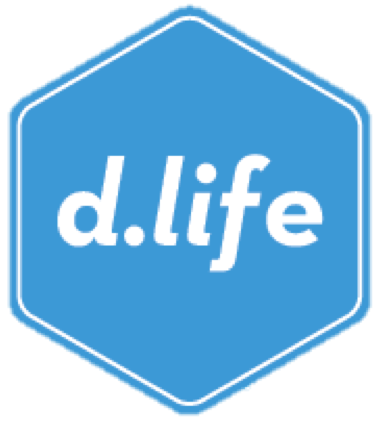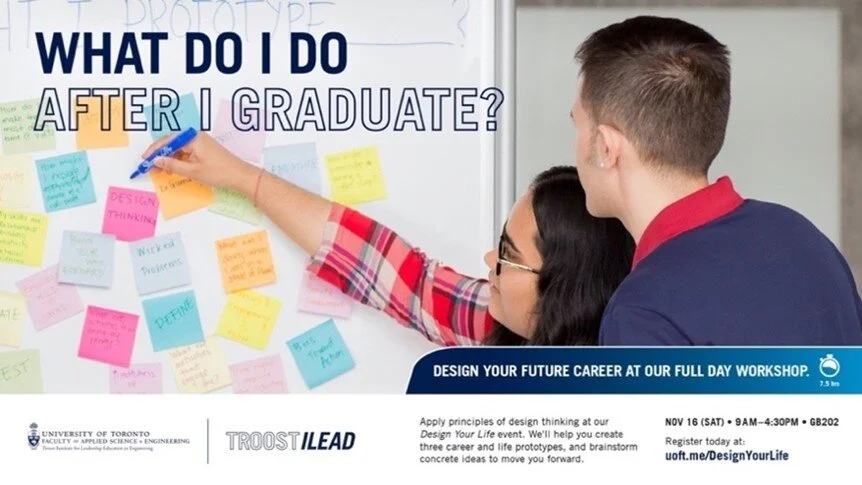Integrating Life Design into Curricular and Co-curricular Experiences for Undergraduate Students,
Graduate Students, and Postdoctoral Fellows
at the University of Toronto
How do you integrate life design into for-credit courses? How do you create life design quick dip vs deep dive co-curricular experiences? How do you tailor life design for different disciplines and degrees?
The University of Toronto (U of T) is tackling these questions using a design thinking mindset. With over 90,000 undergraduate and graduate students, and 800 postdoctoral fellows across three campuses, three teams of faculty and student affairs professionals from different units have attended the Life Design Studio Training. U of T is a large institution where units typically operate independent of one another. As a result, our life design approach is highly context-specific to align with our unit’s priorities and to meet the needs of our unit’s sub-demographics. We are using life design to support students and postdoctoral fellows in self-discovery, skill development, and community building to pursue meaningful career and life pathways with confidence and clarity.
Continuing reading to learn more about life design at U of T.
Troost Institute for Leadership Education in Engineering (Troost ILead), Faculty of Applied Science and Engineering
As leadership educators, we are incorporating life design into leadership development to enrich student’s self-awareness and personal vision to lead their career and life exploration. When we returned from Stanford, we rapidly prototyped a two-hour session for graduate students with our favourite life design activities including dysfunctional beliefs, Odyssey Plans, and idea boards. The session was well received but students wanted more. After reflecting on how to provide a deeper life design experience, we offered four full-day sessions, two for undergraduates and two for graduates/postdoctoral fellows, reaching 150 participants. The session covered topics such as work and world-view, Odyssey Plans, networking, and ten-year reunion. Feedback showed that 85% of participants found the session very to extremely useful because they built a peer network, engaged in self-reflection, and gained meaningful takeaways. One student said “For a lot of engineering students, we don't know what we want to do in the future, and often that is because we don't know what is out there and...we don't know how to seek that information. This session helps you navigate both of those issues in a fun, casual setting backed by evidence-based research”. You can view the facilitation guide, PPT slides, welcome letter, and promotional material here (undergraduate) and here (graduate).
In addition to the full-day sessions, we integrated life design activities into for-credit undergraduate courses and student-staff training. To do this, we connected existing curriculum on personal values and engineering career exploration with life design tools. We also hosted two, two-hour “Best of Design Your Life” for staff and faculty to learn about life design.
With the COVID-19 pandemic, we pivoted our full-day sessions online. Using the mindset of a designer, we radically collaborated and re-connected with our table teammates at the University of Technology Sydney who had facilitated life design online. We re-imagined our “full-day” session as 1.5 hr of asynchronous pre-work on a Canvas site with videos and reflection activities on dysfunctional beliefs, marketplace realities, work- and world-view, and decision-making. The videos provided an opportunity to more explicitly highlight U of T Engineering resources and reference ideas already explored in our existing leadership programming. The videos are followed by a half day (two, two-hour synchronous sessions) on Zoom to work on Odyssey Plans, idea boards, and prototypes. You can view the facilitation guide, PPT slides, and promotional material here (undergraduate) and here (graduate).
For more information contact: Teresa Didiano (t.didiano@utoronto.ca) and Albert Huynh (albert.huynh@utoronto.ca). You can access materials here: https://drive.google.com/drive/folders/1lie6wwVLF8H2uRKlcDC2wV0LOS_eIsU5?usp=sharing
Temerty Faculty of Medicine
At the Temerty Faculty of Medicine, faculty have integrated several life design tools into our core, for-credit professional development courses that support graduate students to explore career paths in academia and beyond. Over 400 graduate students in the Masters of Health Science, Masters of Science, and PhD streams in the departments of Biochemistry, Immunology, Physiology and the Institute of Medical Science carry out tools such as Odyssey Plans, prototypes, and decision-making. The Department of Pharmacology and Toxicology also implemented a co-curricular life design workshop series for all incoming first-year PhD students. Students have benefited from these life design tools with one student saying: “I am still not 100% sure what career path I am going to follow, but the tools and skills I learnt through this course have given me a confidence that I previously lacked”. Many surveys and testimonials echo this sentiment.
We also hosted a professional development workshop for 20 faculty to introduce them to life design and train them in tools that they may find useful in their own personal and professional lives. We covered energy flow and decision-making, and received positive feedback on the experience.
For more information contact: Helen Miliotis (helen.miliotis@utoronto.ca).
Faculty of Arts and Science
At the undergraduate level, faculty from biomedical departments (Biochemistry, Pharmacology and Toxicology, Physiology) have come together to offer a joint third-year course titled Research Readiness and Biomedical Discoveries with a total enrolment of over 150 students over two years. In one class, we use Odyssey Plans to help prepare students for their next steps after graduation. Course evaluation surveys indicated high satisfaction with the Odyssey Plans, with one student saying: “…my Odyssey Plan challenged me as a student to think outside of the box as to how I select my career and the reasoning behind it”.
In the co-curricular realm, we offer workshops of various lengths that include life design tools as part of the second-year learning communities. These communities consist of small groups of second-year students who take a few classes together and meet on a weekly basis facilitated by Peer Mentors (upper-year students) for useful activities that included energy flow and decision-making, reaching about 100 students. The success of the program allowed its expansion to first-year learning communities, potentially reaching many hundreds of students in future years.
For more information contact: Helen Miliotis (helen.miliotis@utoronto.ca).
School of Graduate Studies
At the School of Graduate Studies, we have offered a variety of Design Your Life non-credit, mini-courses over the past three years. Our usual course is three to four weeks with a deliverable each week. One of the most successful offerings happened by accident. The projector died before the first class. Since we could not use slides, the class was completely discussion-based at small tables. The feedback was very positive, and it challenged how we approach life design. We now have a greater focus on preparing students for the course through a competitive application process which has resulted in deeper conversations at tables.
Our two most interesting variations were a Mindfully Designing Your Life course and a Design Your Life Wellness workshop. For the mindfulness program, we asked students to commit to meditating each day for 10 minutes and to journal their experience while participating in the course. Due to the focus on mindfulness, students wanted more mindfulness theory. We will try this variation again soon with different framing. The Design Your Life Wellness workshop was created during a low point in the pandemic and the feedback was also very positive. We spent a lot of time on acceptance. Participants liked having time to think about wellness and appreciated the encouragement to prototype small steps.
For more information contact: Liam O’Leary (liam.oleary@utoronto.ca).

